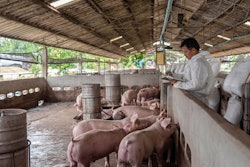
Seventeen years after the present version, the FAO is launching an updated monitoring system that will help in the control of animal diseases, such as African swine fever (ASF).
There is a need for greater vigilance for emerging animal disease across the world, according to the United Nations’ Food and Agriculture Organization (FAO).
“Strong international and national animal health systems are key to prevent diseases, ensure safe and nutritious food, and protect farmers’ interests,” said the Organization’s director-general Qu Dongyu last week.
Qu was speaking at the launch of the FAO’s EMPRES-i+ system in Rome. The presentation was set to coincide with UN World Development Information Day on October 24.
The new version replaces the EMPRES-i, which has been used by countless local stakeholders and global organizations since its launch in 2004. Among the features of the upgrade are its use of a cloud-based platform, more advanced data analysis, and new early warning functions.
“The new EMPRES-i+ underlines the value of early warning information systems for improving lives and livelihoods,” said Qu. “But this can only be achieved through collective information sharing and early action.”
Among the major animal diseases threatening food security and livelihoods is African swine fever (ASF), according to the FAO.
Nine new ASF outbreaks confirmed in South Africa
Over the past four weeks, new outbreaks of ASF among South Africa’s domestic pigs have been officially reported to the World Organisation for Animal Health (OIE).
Latest cases were reported in four provinces: four in Western Cape, three in Eastern Cape, and one each in Gauteng and Free State. For the majority of these outbreaks, cases were identified during the months of August and September. However, three are retrospectively reported from December 2020, as well as April and June of this year.
Western Cape outbreaks affected two small farms — of 70 and 101 pigs, respectively — and two village herds comprising 15 and 500 animals. ASF outbreaks reported in the other provinces affected village herds, each comprising 22-500 pigs.
Latest outbreaks bring the country’s total to 124, and the number of pigs directly impacted to almost 51,000.
Currently, there are three ASF outbreak series in South Africa, according to OIE notifications. The first of these started in April 2019 in Mpumalanga, and subsequently spread to include Gauteng, Free State and the North West. One year later saw the first cases in Eastern Cape, and the current series in Western Cape began in February 2021.
ASF ‘resolved’ in Ivory Coast (Côte d‘Ivoire)
Veterinary authorities for this West African state have declared the ASF situation closed to the OIE.
In April, a single outbreak was reported. It occurred at a small farm in Donzosso, which is in the eastern district of Zanzan. Of the 99 pigs in the herd, 30 died and the rest were destroyed. The outbreak was considered ended in early August. No further cases have been reported in the country.
Source of the infection was identified as the introduction of live animals. The affected premises appears to be located near to the border with Ghana, where recent cases of ASF have been reported by local media.
Update on ASF situation in Caribbean region
In the past four weeks, 10 new outbreaks of ASF in the Dominican Republic have been reported to the OIE. Starting between August 7 and September 20, all affected herds were described as “backyards.” Each had between five and 110 pigs.
The latest outbreaks occurred in seven of the country’s provinces, and included the first cases in Valverde. This brings to 24 the number of provinces recording at least one outbreak of ASF.
Since the nation’s first ASF cases in April, the number of confirmed outbreaks has reached 87. Directly impacted have been a total of more than 9,800 pigs.
To the west of the Dominican Republic on the Caribbean island of Hispaniola is the Republic of Haiti.
First cases of ASF in Haiti were confirmed in late August.
Latest official report from this nation’s animal health agency to the OIE updates the disease situation. So far, seven outbreaks occurred up to September 14. All were in herds described as “backyards,” each with 6-25 pigs. Total pigs affected so far stands at 94.
Of the country’s 10 departments, ASF has been detected in three, including two — Nord-Est and Sud-Est — that border the Dominican Republic.
US addresses ASF threat
Proximity of these Caribbean states, and the spread of the infection in that region are leading swine industry stakeholders in the U.S. to face the possibility that ASF could enter the country at any time.
To prepare for that scenario, the U.S. Department of Agriculture recently held a series of webinars aimed to support efforts to safeguard the nation’s swine herd.
ASF is identified as among the top 3 issues that animal feed industry stakeholders in the U.S. have on their minds for 2022, according to the national feed association.
View our continuing coverage of the global African swine fever situation.

















